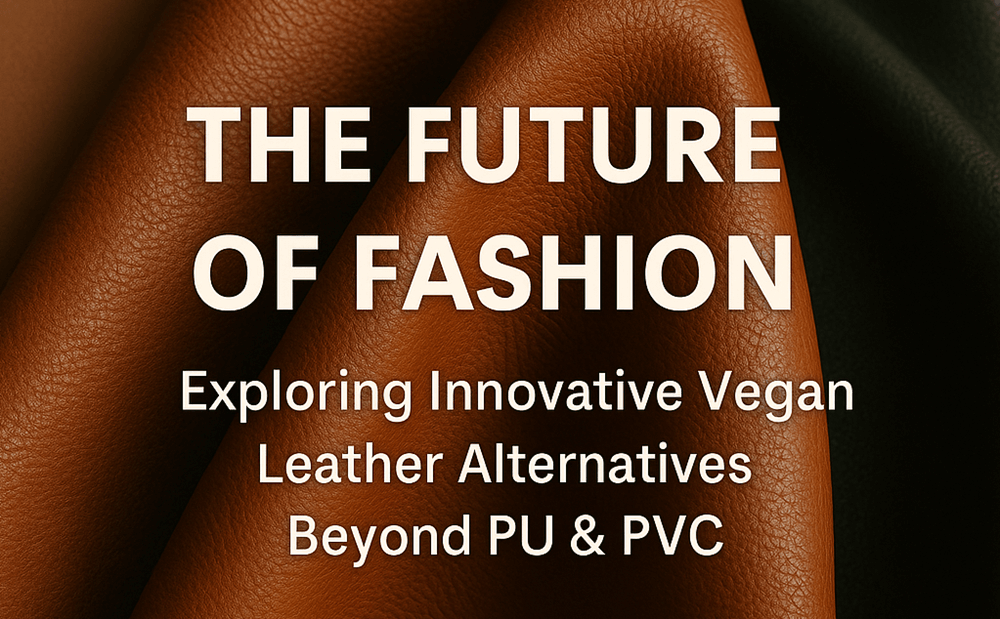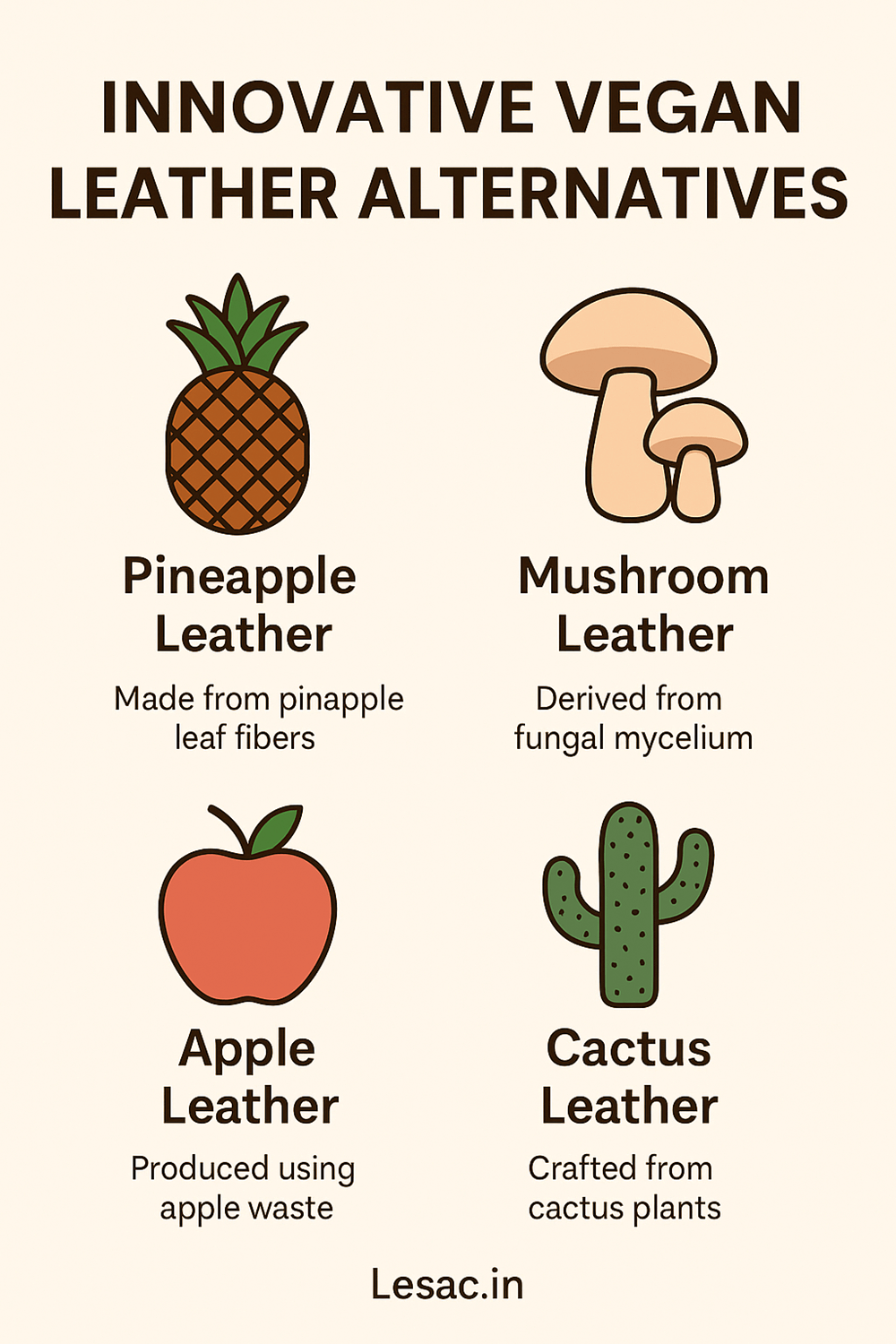
In today’s world, sustainability is no longer a trend—it’s a necessity. While vegan leather has long been hailed as a cruelty-free alternative to animal hide, the industry has largely relied on PU (polyurethane) and PVC (polyvinyl chloride). Though these materials are animal-free, they are still petroleum-based and non-biodegradable, raising significant environmental concerns. As conscious consumers look beyond the surface, the fashion industry is responding with a wave of innovative vegan leather options that are both stylish and genuinely sustainable.
Let’s dive into the exciting future of eco-friendly leather alternatives, from mushroom leather to cactus leather, and how brands like LeSac are playing a role in this sustainable fashion movement.
The Problem with PU and PVC: Why We Need a Change
Traditional vegan leathers such as PU and PVC have given fashion lovers an ethical choice over animal leather. However, these synthetic materials come with their own set of issues:
- Non-biodegradable: PU and PVC do not break down naturally and contribute to microplastic pollution.
- Toxic production: These materials are manufactured using harsh chemicals that can harm both the environment and factory workers.
- Petroleum-based: They rely on fossil fuels, which are neither renewable nor sustainable.
As awareness grows, it’s clear that true sustainability in fashion must go beyond animal welfare and consider the full lifecycle of the materials used.
Innovative Vegan Leather Alternatives
Thankfully, science and nature are working together to give us truly sustainable fashion materials. Here are some of the most exciting eco-friendly leather alternatives that are shaping the future:
🌳 Mushroom Leather (Mycelium)
Derived from the root system of fungi, mushroom leather (often branded as Mylo) is soft, flexible, and biodegradable. It can be grown in days and doesn’t require tanning chemicals. Major brands like Stella McCartney have already incorporated mushroom leather into their luxury collections.
🍍 Pineapple Leather (Piñatex)
Pineapple leather is made from the fibers of pineapple leaves, a byproduct of the fruit industry. It’s breathable, durable, and offers a slightly textured surface perfect for bags, shoes, and accessories. Brands like Hugo Boss and H&M Conscious Collection are early adopters.
🌵 Cactus Leather (Desserto)
Cactus leather is produced from the nopal cactus in Mexico and is fast becoming a favorite due to its low water usage and biodegradability. It’s strong, flexible, and suitable for a range of fashion products. Brands like Karl Lagerfeld and Fossil have embraced this material.
🍏 Apple Leather
Made from apple peels and waste left over from the juice industry, apple leather is smooth, semi-matte, and ideal for accessories. It’s lightweight, durable, and increasingly popular with ethical fashion labels like Luxtra London and VEERAH.
🍇 Other Emerging Materials
From grape leather (crafted from wine industry leftovers) to coconut and corn leather, innovation in vegan materials is accelerating. These options not only reduce agricultural waste but also offer creative new textures and finishes.
Why These Alternatives Matter
These innovative vegan leather options are more than just eco-hype. They offer real, measurable benefits:
- Lower carbon footprint compared to PU/PVC and animal leather
- Biodegradability, reducing long-term environmental impact
- Ethical sourcing without animal cruelty
- Support for circular economies by using agricultural byproducts
- Stylish and functional, proving that sustainability doesn’t mean compromising on aesthetics
Brands Leading the Change: Featuring LeSac
While global giants are experimenting with alternative leathers, homegrown ethical brands are making an equally strong impact. LeSac is a proudly Indian vegan fashion label that creates luxury bags without compromising on ethics or design.
LeSac doesn’t use animal leather or harmful synthetics like PVC. Instead, they focus on high-quality, eco-friendly leather alternatives to craft their chic and timeless collections. Their commitment to sustainability is evident in their design philosophy, small-batch production, and eco-conscious packaging.
For a deeper dive into LeSac’s ethical values and material choices, check out their blog post on Eco-Friendly Sustainable Bags.
From versatile Women’s clutches to footwear, LeSac is proving that sustainable fashion materials can be just as luxurious and practical as traditional ones.
“Sustainability doesn’t mean compromising on style—it means creating a future where beauty and ethics coexist.” – LeSac Design Team
Challenges to Overcome
Despite all the progress, there are still hurdles to scaling innovative vegan leathers:
- Higher production costs than traditional synthetics
- Limited availability in global supply chains
- Durability testing for certain materials is still ongoing
- Consumer education: Many shoppers still equate vegan leather with PU/PVC
But with growing demand and investment, these barriers are slowly breaking down.
The Environmental Case: Why Innovation Is Urgent
If the environmental reasons to shift away from PU and PVC aren’t compelling enough, here are some powerful facts to consider:
- Over 92 million tons of textile waste are produced globally every year.[1]
- 20% of global industrial water pollution comes from textile dyeing and treatment processes, especially in leather tanning.[2]
- PU and PVC-based leather alternatives emit three times more CO₂ than traditional animal leather across their lifecycle.[3]
- Less than 1% of clothing is recycled into new garments, making durability and biodegradability critical for future fashion systems.[4]
By switching to innovative vegan leather like mushroom leather, cactus leather, and pineapple leather, brands can drastically reduce their environmental footprint and contribute to a circular, regenerative fashion economy.
Conclusion: The Future Is Plant-Based and Promising
As consumers become more conscious of the impact their purchases have on the planet, the fashion industry must evolve. Moving beyond PU and PVC is not just a trend—it’s a responsibility.
With the rise of mushroom leather, pineapple leather, cactus leather, and other eco-friendly leather alternatives, we are entering a new era of responsible fashion. Brands like LeSac are at the forefront of this shift, offering elegant, ethical products that align with modern values.
The future of fashion is innovative, plant-based, and brighter than ever. And it starts with what we choose to wear—and carry—every day.

